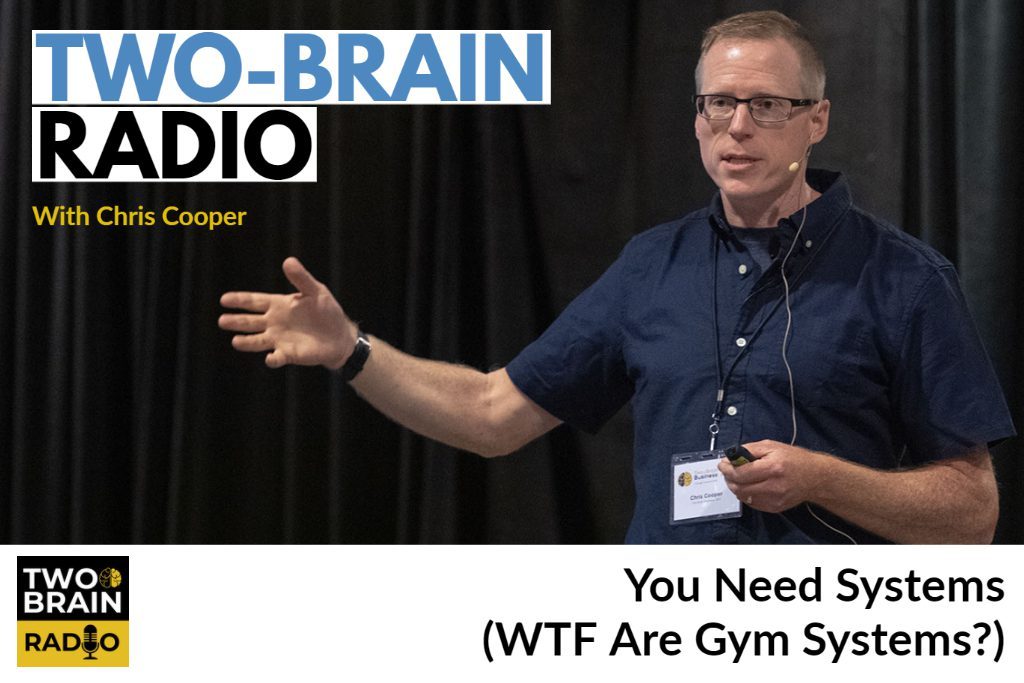Mike (00:02):
Gym system? What the framework is a system? I don’t need that corporate stuff. We figure it out on the fly over here. That plan will work until it doesn’t. And then you’ll wish you had put systems in place. Here’s Chris Cooper on Two-Brain Radio.
Chris (00:18):
Your business scales on systems, not on you. My name’s Chris Cooper. And for the last eight years, I’ve been writing books and doing podcasts about business systems and how important they are. But yesterday I was chatting in our free public Facebook group called Gym Owners United. And we were talking about something that gave me a great example of what a system actually is, because if you can’t picture what I mean by systems, then this message might not sink in as well as it could. The owner was asking about playing music in the gym and he was like, what do you allow? What do you not allow? And what are your staff allowed to do? How do you make sure that they’re playing the right music? And he got a big variety of answers, but the music in your gym is a great example of one important system that you can easily resolve once and never have to deal with again.
Chris (01:09):
And I’ll also explain why it’s valuable to have systems, even in cases as small as these. The music that you listen to in your gym should be systemized. You should be able to say, here are two playlists, or here’s like the radio channel that you put it on when you get here in the morning. So in our gym’s opening checklist, you get here at 6:45 or whatever it is, you turn on internet radio, satellite radio, whatever it is, you put on this station at this volume. And that’s it. And you move on to the next thing on the checklist. The matter is already decided. So you don’t have to go back and forth. What most gyms do is they say, OK, please be here by 7:45 or 6:45, turn on the lights, make sure that the garbage has been taken outta the bathrooms, turn on the music and let’s go.
Chris (02:01):
And what typically happens is the morning coach will put on the music that they like at the decibel level that they like. And then that class will end and the music will just keep rolling. And then the next coach will come in and they’ll turn on a different radio station. And maybe it’s noon time. And your noon coach is a little bit older and they’ll put on like classic rock. OK. And then at four o’clock, somebody comes in, the coach is there by themself. They’re just working out. They’ll put on some crazy gangster rap that they like. And at five o’clock when the next group starts, the coach has to like, turn the music down if they remember and put on something else and maybe it’s like, you know, top 40 or whatever. OK. So if you’ve been following along, maybe you recognize that there are multiple points of problems here.
Chris (02:52):
The first is that the first coach of the day might not be putting on the kind of music that is upbeat or inspiring for their class, or maybe they are. The second coach of the day is playing something different. You know, maybe most of the people in your class, don’t like classic rock. The crazy like gangster rap stuff at four o’clock is a massive problem. Because if somebody wanders in off the street and they’re like, what is this gym? And that’s what they hear, they’re probably just gonna walk right back out again. Sorry. And then at five o’clock, if that coach is just finishing up their workout, the people coming in for the five o’clock class are maybe hearing something that you don’t want associated with your gym. You have to think about the sounds that people hear the same way you think about the signs that people see on your gym.
Chris (03:40):
Your music is just the same as your logo. It’s the same as your billboard. It’s the same as your Facebook ad. And if you are running ads talking about community and inclusiveness, but somebody comes into your gym and they hear music that turns them off, you might as well just drop a sign in front of their face that says you don’t fit here. OK? So a system is just decisions that you make in advance. Now, if you didn’t make this decision in advance and you told the coaches, nah, play it by ear, little pun there, or you told the coaches just put on music, whatever you want to, don’t make it too loud. You’re leaving it to them to have to guess. And if they have to guess, there’s a chance that they could be wrong. You need to make these decisions in advance and then just stick with them.
Chris (04:25):
Imagine what happens if they make the wrong music choice. People complain that it’s not loud enough. People complain that it’s too loud. They complain in the class. So the class gets interrupted while the coach adjusts the noise, they complain after class. So your day and your mindset and your focus get interrupted while you try and address the problem with the coach. So you have to book a meeting with the coach. You have to have a sit down, you have to phrase it, you know, oh coach, I know you like this, but like, let’s try and keep it straight. And then you probably have to have that same conversation again. And then the next time, you know, you have to have that same converstaion with all the coaches. And now it turns into a staff meeting issue when you could have solved the problem one time in advance without taking up more of your focus or attention.
Chris (05:12):
This is the tiniest example of a system, which is just a decision made in advance. And the reason that we want these in our business is because you, as the owner, suffer from decision fatigue. Every time you have to make a decision, no matter how small, including what kind of toast to eat in the morning or what dial to set the radio to, your ability to make bigger decisions becomes impaired. You’re more likely to become paralyzed. You’re more you to become overwhelmed. You’re less likely to take action on things that actually matter later. But there’s a better reason that you need systems. And that is to remove the burden of choice from your staff. Jocko Willinck says discipline equals freedom. Discipline is not willpower. Discipline is rules. Discipline is systems. We do it exactly like this. When the room is clean, here’s how it looks.
Chris (06:08):
Here’s the soap that we use. Here’s how often we mop. Here’s how hot the water is in the bucket. These are systems. Now I used the simplest example I could, the music in your gym, to illustrate how many ways your business can stress you out if you don’t have systems or decisions made in advance. If you extrapolate that lesson to other things like what time do coaches show up for class? Or how long is a class or how long does the warm-up go? Or how do you set your rates? Or what’s my hold policy or cancellations. There are hundreds of them. If you’ve made the decisions in advance, all your coaches have to do is follow those instructions. But if you haven’t made those decisions in advance, your coaches can’t follow the instructions because they’ll be forced to make decisions. And every time they make a decision, there’s a chance they will be wrong.
Chris (07:13):
And every time they’re wrong, you have to step in and fix it. And that is why your business can’t scale. It starts with something tiny, like how to open the gym in the morning, what station to turn the radio to. But what you’ll find is that when you start by building these tiny systems soon, you’ll build another layer of systems on top and another layer on and everybody will start finding the job easier. You’ll find the gym less stressful because you’ll have fewer decisions to make. And these systems will begin to replace you when it’s time to make decisions by your staff. And when your decisions are replaced by systems, then you are able to scale your gym by adding more volume in the form of more clients or more locations or whatever that is. Without systems, you will always be stuck adjusting the volume.
Mike (08:09):
We’re systematic. Two-Brain Radio comes out on Mondays and Thursdays every week. Hit subscribe now so you never miss a show. Now, Coop’s back to close it up.
Chris (08:18):
Thanks for listening to Two-Brain Radio. If you aren’t in the Gym Owners United group on Facebook, this is my personal invitation to join. It’s the only public Facebook group that I participate in. And I’m there all the time with tips, tactics, and free resources. I’d love to network with you and help you grow your business. Join Gym Owners United on Facebook.

